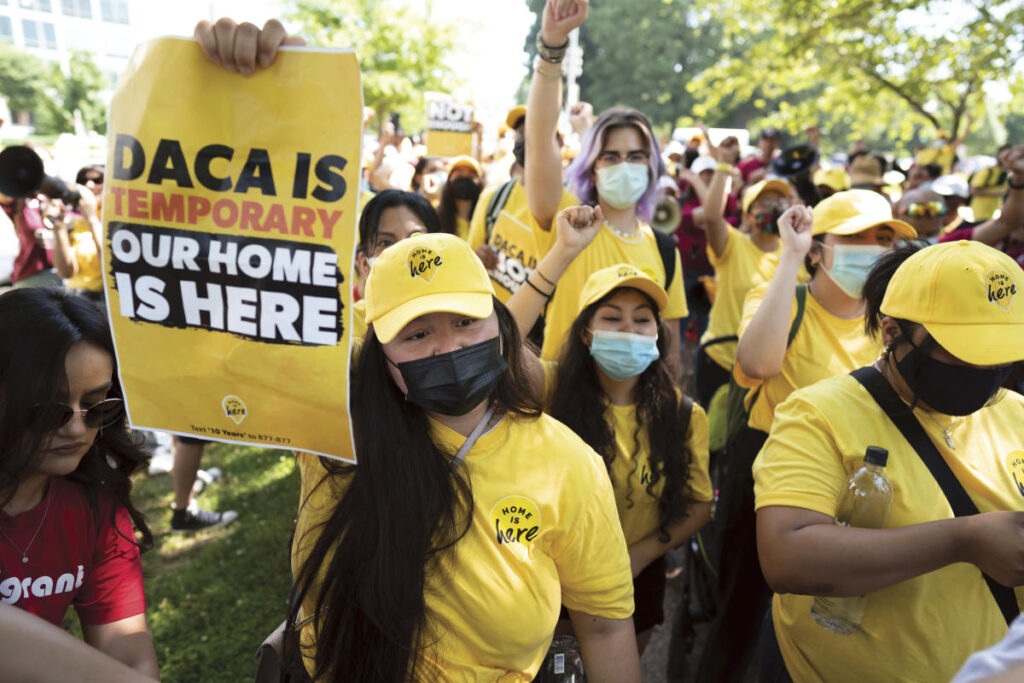Immigrants who came to the United States as children facing deportation will be at the forefront of a demonstration outside a federal courthouse in New Orleans on Thursday, coinciding with a hearing by a panel of three appellate judges regarding the Biden administration’s policy designed to protect them from deportation. This legal battle significantly impacts approximately 535,000 individuals who have established their lives in the United States but lack citizenship or legal residency, living under the continuous threat of deportation. Greisa Martinez Rosas, a recipient of the Deferred Action for Childhood Arrivals (DACA) program and a prominent leader of the advocacy group United We Dream, expressed her commitment to the U.S. and her intention to improve the nation for everyone, highlighting the emotional stakes surrounding the case.
DACA, created by former President Barack Obama in 2012 in response to congressional inaction on immigration reform, has been a focal point of legal debate ever since its inception. The policy granted temporary relief from deportation to eligible undocumented immigrants who were brought to the U.S. as children, granting them work permits and allowing them to pursue their education. President Joe Biden sought to safeguard the program, but its future became uncertain following a ruling in September 2023 by U.S. District Judge Andrew Hanen, who concluded that the executive branch had exceeded its authority in establishing DACA. Although he prohibited the government from approving new applications, he allowed existing recipients to continue their protections during the ongoing legal appeals.
The ongoing legal challenges to DACA are primarily led by Texas and several other Republican-dominated states, which argue that the program imposes financial burdens on state resources. In their briefings, the states assert that allowing immigrants to remain in the country illegally incurs costs in areas such as healthcare and education, amounting to hundreds of millions of dollars. They are joined by organizations like the Immigration Reform Law Institute, which argues that Congress has repeatedly failed to legislate a pathway to citizenship for DACA recipients, thus asserting that no administration has the authority to unilaterally implement such provisions.
Defenders of DACA maintain that the Department of Homeland Security has the authority granted by Congress to manage immigration policy, arguing that the states challenging the program lack legal standing, as they cannot demonstrate any specific harms resulting from DACA. Nina Perales, vice president of the Mexican American Legal Defense and Educational Fund, emphasized in a recent news conference that the plaintiffs’ claims are without merit. This highlights an existing disconnect between lawmakers and the immigrant communities impacted by these policies, reinforcing the importance of considering the lived experiences of the individuals directly affected by these legal rulings.
The case’s panel at the 5th U.S. Circuit Court of Appeals, consisting of judges nominated by both Republican and Democratic presidents, will not reach an immediate ruling. A decision on the case is likely to eventually escalate to the U.S. Supreme Court, indicating the complex political and legal dynamics surrounding DACA. The interplay of differing judicial philosophies and political ideologies among the justices illustrates the potential for varied interpretations of immigration law, further complicating the future of DACA recipients. The implications of the court’s decision will resonate beyond the lives of the immediate beneficiaries, impacting the broader discourse surrounding immigration and policy reform in the country.
As the hearing unfolds, it serves as a flashpoint for advocating inclusivity and reform within the immigration system. The presence of demonstrators, including young people who identify as Dreamers, underscores the personal stakes involved in the legal proceedings. Their stories and experiences illustrate the competing narratives on immigration, citizenship, and belonging, portraying Dreamers as active contributors to their communities despite their uncertain legal status. This ongoing struggle for legal recognition is emblematic of a broader national debate on immigration policy and the role of executive action in shaping that policy.
In conclusion, the legal proceedings surrounding DACA in New Orleans highlight the precarious situation faced by hundreds of thousands of immigrants who have spent most of their lives in the United States without legal status. The outcome of this case may have lasting implications, not only for the individuals directly involved but also for the future of immigration policy in the U.S. As legal arguments continue to unfold, the voices of those affected by DACA will remain vital in shaping the discourse around citizenship and the rights of immigrants, emphasizing the need for comprehensive reform to address the complex realities of contemporary immigration challenges.

